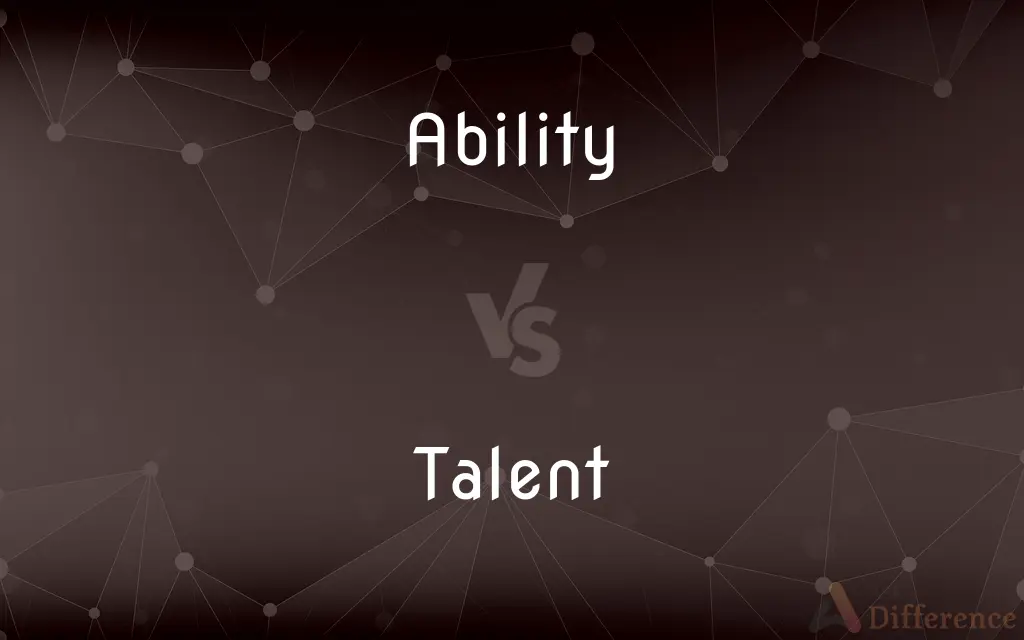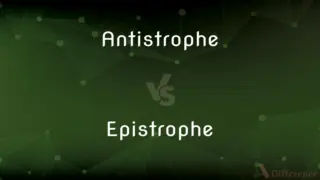Ability vs. Talent — What's the Difference?
Edited by Tayyaba Rehman — By Maham Liaqat — Updated on March 13, 2024
Ability refers to acquired skills or expertise, while talent is a natural aptitude or skill.

Difference Between Ability and Talent
Table of Contents
ADVERTISEMENT
Key Differences
Ability encompasses the skills and knowledge that an individual acquires through practice, learning, and experience. It reflects one’s competency in specific areas, which can be developed and improved over time with effort and training. Talent, in contrast, refers to a natural predisposition or innate skill that an individual possesses without the need for extensive learning or practice. It is often perceived as an inherent gift in areas such as art, music, sports, or mathematics.
While abilities can be developed in a wide range of fields depending on one’s interests and dedication, talents are usually more specific and are often recognized at an early age. Talents can give individuals a significant advantage in certain activities, but developing a talent into a refined skill often requires nurturing through practice and education.
The relationship between ability and talent is interconnected, as talents can enhance one’s ability in a particular field, and honing one’s abilities can lead to the discovery of latent talents. Both are important for personal development and success, but they differ in their origin: abilities stem from learned and practiced skills, whereas talents are often considered innate.
Recognizing the difference between talent and ability is crucial in education and personal development, as it can guide individuals in choosing fields where they can excel and enjoy the most satisfaction. While talent can provide a strong foundation, the development of abilities through continuous effort and learning is essential for achieving expertise and success in any field.
Comparison Chart
Origin
Acquired through learning and practice.
Innate, natural predisposition.
ADVERTISEMENT
Development
Can be developed in various fields with effort and training.
Often specific to certain activities and recognized early on.
Improvement
Enhanced through continuous practice and education.
Can be refined and maximized through nurturing and practice.
Role in Success
Crucial for achieving expertise and competency.
Provides a natural advantage but requires development for mastery.
Examples
Fluency in a foreign language, proficiency in a software tool.
Natural aptitude for music, exceptional athletic prowess.
Compare with Definitions
Ability
A learned skill through practice or education.
Her ability to solve complex mathematical problems improved with practice.
Talent
An inherent aptitude or natural skill.
Her talent for painting was evident in her early childhood artworks.
Ability
Reflects competence and expertise in a field.
His coding abilities were honed through years of software development.
Talent
Can provide a foundation for excellence in specific areas.
Athletes with natural talent often excel with proper training.
Ability
Necessary for professional growth and success.
Enhancing managerial abilities is crucial for leadership roles.
Talent
Often evident without extensive training.
His musical talent allowed him to play melodies by ear from a young age.
Ability
Can be developed and expanded over time.
She developed her public speaking abilities through courses and experience.
Talent
Needs to be nurtured and developed for full potential.
Despite her natural talent for writing, she attended workshops to refine her skills.
Ability
Varied and adaptable to different contexts.
Learning multiple languages increases linguistic abilities and cultural understanding.
Talent
Recognized and valued in various fields.
Talent scouts seek out individuals with exceptional natural skills in sports and entertainment.
Ability
A skill, talent, or capacity
A student of many abilities.
Talent
A marked innate ability, as for artistic accomplishment
Has a rare talent for music.
Ability
(uncountable) The quality or state of being able; capacity to do or of doing something; having the necessary power.
This phone has the ability to have its software upgraded wirelessly.
This wood has the ability to fight off insects, fungus, and mold for a considerable time.
Talent
Natural endowment or ability of a superior quality
The play has a cast of immense talent.
Ability
Physical power.
Talent
A marked natural ability or skill.
He has a real talent for drawing.
Ability
Possession of the means or skill to do something
The manager had lost his ability to motivate the players
Talent
Natural aptitude or skill
He possesses more talent than any other player
She displayed a talent for garden design
Ability
Talent, skill, or proficiency in a particular area
Pupils of all abilities
A man of exceptional ability
Talent
A former weight and unit of currency, used especially by the ancient Romans and Greeks
A mighty steed bought from a Thessalian merchant for thirteen talents
Ability
The quality of being able to do something, especially the physical, mental, financial, or legal power to accomplish something.
Talent
A person or group of people having such ability
The company makes good use of its talent.
Ability
The quality of being suitable for or receptive to a specified treatment
The ability of a computer to be configured for use as a file server. See Usage Note at able.
Talent
A variable unit of weight and money used in ancient Greece, Rome, and the Middle East.
Ability
(obsolete) Suitableness.
Talent
(historical) A unit of weight and money used in ancient times in Greece, the Roman Empire, and the Middle East, equal to about 30 to 60 kg in various times and places.
Ability
The legal wherewithal to act.
Talent
(obsolete) A desire or inclination for something.
Ability
(archaic) Financial ability.
Talent
People of talent, viewed collectively; a talented person.
The director searched their talent pool to fill the new opening.
Ability
(uncountable) A unique power of the mind; a faculty.
Talent
(slang) The men or (especially) women of a place or area, judged by their attractiveness.
Not much talent in this bar tonight—let's hit the clubs.
Ability
(countable) A skill or competence in doing; mental power; talent; aptitude.
They are persons of ability, who will go far in life.
She has an uncanny ability to defuse conflict.
A mixed-ability class
Talent
Among the ancient Greeks, a weight and a denomination of money equal to 60 minæ or 6,000 drachmæ. The Attic talent, as a weight, was about 57 lbs. avoirdupois; as a denomination of silver money, its value was £243 15s. sterling, or about $1,180.
Rowing vessel whose burden does not exceed five hundred talents.
Ability
The quality or state of being able; power to perform, whether physical, moral, intellectual, conventional, or legal; capacity; skill or competence in doing; sufficiency of strength, skill, resources, etc.; - in the plural, faculty, talent.
Then the disciples, every man according to his ability, determined to send relief unto the brethren.
Natural abilities are like natural plants, that need pruning by study.
The public men of England, with much of a peculiar kind of ability.
Talent
Among the Hebrews, a weight and denomination of money. For silver it was equivalent to 3,000 shekels, and in weight was equal to about 93 lbs. avoirdupois; as a denomination of silver, it has been variously estimated at from £340 to £396 sterling, or about $1,645 to $1,916. For gold it was equal to 10,000 gold shekels.
Ability
The quality of being able to perform; a quality that permits or facilitates achievement or accomplishment
Talent
Inclination; will; disposition; desire.
They rather counseled you to your talent than to your profit.
Ability
Possession of the qualities (especially mental qualities) required to do something or get something done;
Danger heightened his powers of discrimination
Talent
Intellectual ability, natural or acquired; mental endowment or capacity; skill in accomplishing; a special gift, particularly in business, art, or the like; faculty; a use of the word probably originating in the Scripture parable of the talents (Matt. xxv. 14-30).
He is chiefly to be considered in his three different talents, as a critic, a satirist, and a writer of odes.
His talents, his accomplishments, his graceful manners, made him generally popular.
Talent
Natural qualities or talents
Talent
A person who possesses unusual innate ability in some field or activity
Common Curiosities
Can anyone develop an ability?
Yes, most people can develop abilities in various fields through dedicated learning and practice.
How can one identify their talents?
Talents can often be identified through activities that come naturally and enjoyably to an individual, and where they show exceptional skill compared to others.
Are abilities limited to academic or professional skills?
No, abilities can encompass a wide range of skills, including interpersonal, physical, and creative competencies.
What role do educators play in developing talent and ability?
Educators can identify and nurture talents, provide guidance for skill development, and encourage the continuous growth of abilities.
Is talent necessary for success?
While talent can provide an advantage, many individuals achieve success through hard work and developing their abilities, regardless of innate talent.
Can talent be wasted?
Yes, without proper nurturing, practice, and development, natural talent may not reach its full potential.
Can talents change over time?
While the core nature of a talent may remain constant, its expression and application can evolve with experience and practice.
Is it possible to have talents in multiple areas?
Yes, it's possible for individuals to have talents in more than one area, though they may choose to focus on developing certain talents more than others.
How important is practice for someone with talent?
Practice is crucial for refining and maximizing talent, turning raw potential into skilled performance.
Can a strong ability ever be considered a talent?
If an ability becomes exceptionally developed, it may be perceived as a talent, especially if it significantly surpasses the average level of skill in that area.
Share Your Discovery

Previous Comparison
Antistrophe vs. Epistrophe
Next Comparison
Big vs. HugeAuthor Spotlight
Written by
Maham LiaqatEdited by
Tayyaba RehmanTayyaba Rehman is a distinguished writer, currently serving as a primary contributor to askdifference.com. As a researcher in semantics and etymology, Tayyaba's passion for the complexity of languages and their distinctions has found a perfect home on the platform. Tayyaba delves into the intricacies of language, distinguishing between commonly confused words and phrases, thereby providing clarity for readers worldwide.














































